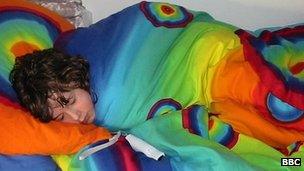Chronic fatigue syndrome 'affects one in 100 pupils'
- Published

One in 100 secondary school pupils could be missing classes because of chronic fatigue syndrome, also known as Myalgic Encephalomyelitis (ME), say researchers.
A study following 2,855 pupils at three schools, published in the online journal BMJ Open, found 28 missed school with chronic fatigue syndrome.
The researchers said the effect was "potentially devastating".
A charity said the true figure was likely to be even higher.
The cause of chronic fatigue syndrome is unknown and there is no known cure. It is a medical condition rather than just schoolchildren staying up too late. It results in extreme tiredness as well as problems with memory and concentration.
The researchers looked at every pupil between the age of 11 and 16 at three secondary schools in Bath. The 461 pupils who were absent for at least a day a week in a six-week term were investigated further.
Five had already been diagnosed with chronic fatigue and a further 23 cases were identified.
'Phenomenal number'
Overall 1% of pupils had chronic fatigue and the illness accounted for more than 6% of pupils who were missing large amounts of school.
Dr Ester Crawley, researcher at the University of Bristol, told the BBC: "The impact of missing school is potentially devastating."
Caution is needed when drawing conclusions about all schoolchildren from a study in three schools, but Dr Crawley believes the 1% figure could be too small.
She says the study looked at the pupils who were missing the most school: "Missing one day a week is severe. The total level [of chronic fatigue syndrome] is going to be higher."
The chief executive of the Association of Young People with ME, Mary-Jane Willows, said the impact of the illness was "horrendous" and that "1% is a phenomenal number. It proves the problem we're up against."
But she added: "I would say that it is on the lean side, it is at least 1%, there is a hidden population out there."
Of the newly diagnosed pupils, 19 chose to have treatment. They were given either cognitive behavioural therapy, which alters the way people think and cope with their symptoms, or graded exercise therapy, a gradual and supervised increase in activity levels.
Rebecca: "I just slept all the time and I never felt any better"
Twelve of them were back to school full time after six months, six of them had made a full recovery. Another pupil who had been housebound returned to school part-time.
Prof Matthew Hotopf, from the Institute of Psychiatry at King's College London, said: "Chronic fatigue syndrome is not uncommon as a cause of recurrent school absence, and therefore something to actively look for."
He added: "There is everything to play for in terms of outcome for chronic fatigue syndrome in kids. This study demonstrates that about two-thirds had recovered by six months, and that's a really important message for families and GPs."
- Published24 September 2011
- Published18 February 2011
- Published22 September 2011
- Published24 October 2011